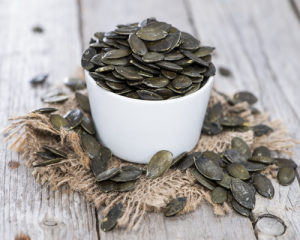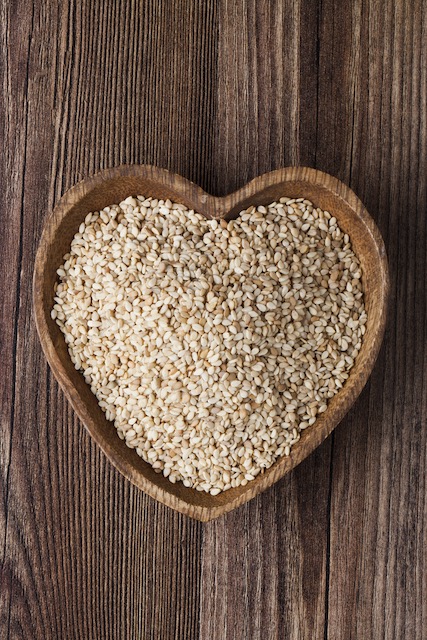Manganese, Chromium and Zinc, oh my!
 Out of all of the trace minerals chromium and zinc are my favourites. Is it normal to have favourite micronutrients? These two are important in reversing autoimmunity and inflammation in the body. I thought it would be fun to include manganese, the underdog, in this week’s article so that we could start a conversation about this not-so-known trace mineral and how we can get more from foods. With manganese too much is too much but of course too little is too little. Consider the micronutrient test from Vibrant Wellness (the one with the full blood draw that measures serum, blood and cell levels, not the finger prick one) if you want to look deeper into your trace mineral levels. Meet with me if you would like help going deeper into that.
Out of all of the trace minerals chromium and zinc are my favourites. Is it normal to have favourite micronutrients? These two are important in reversing autoimmunity and inflammation in the body. I thought it would be fun to include manganese, the underdog, in this week’s article so that we could start a conversation about this not-so-known trace mineral and how we can get more from foods. With manganese too much is too much but of course too little is too little. Consider the micronutrient test from Vibrant Wellness (the one with the full blood draw that measures serum, blood and cell levels, not the finger prick one) if you want to look deeper into your trace mineral levels. Meet with me if you would like help going deeper into that.
Manganese: Just what does it do in the body and why do we need it? Manganese is needed to keep our blood sugars steady. When we have not eaten in a while and our blood sugars drop Gluconeogenesis happens. This is part of the fascinating dance between insulin, blood sugar, glucagon, cortisol and gluconeogenesis that we rely on each day, continually writing checks and balances that keep us on an even keel regardless of how long it has been since our last meal. This is a process whereby our bodies are able to turn amino acids into glucose to give us energy and keep us stable. Stable is good! Manganese is required for the enzymes that enable gluconeogenesis and is therefore required to keep our blood sugar stable when we have not eaten for a while.

Manganese is also essential for bone formation and collagen production. Collagen is very important for the youthfulness of our skin and keeps it flexible, hydrated and elastic. Collagen is also very important in our tendons and ligaments, eyes, healthy hair, bones and in some of our organs. While manganese has been shown to help in bone production it is not clear whether it really has a role in bone loss. The same goes for skin rashes… while Manganese has been shown to reduce skin rashes its deficiency is not really a clear cause. I love to get my manganese from cloves, from wild foods like Samphire and sea vegetables and from spinach and pumpkin seeds. Too much manganese can be hard on the nervous system and can result in shaking, tension and other nervous system symptoms. This can happen in areas where Manganese is particularly high in drinking water.
Chromium: This trace mineral is very important for our blood sugar regulation as well. A deficiency in chromium has been shown to make our insulin receptors less receptive. This is bad! Insulin is the key that allows glucose to get into the cells where it is needed, well, for our energy and our survival… But chromium is actually required for insulin to get the glucose into the cells. It is sort of the butler of our cellular glucose metabolism. So if a lack of chromium locks the door then we are in trouble. To combat this our bodies produce more insulin which further jams everything up by contributing to insulin resistance … One very important solution to this is to make sure our bodies have the chromium they need. There are other minerals needed for this as well but chromium, the cute little mineral, can be overlooked in favour of mineral darlings like Magnesium. Anecdotally I have seen Chromium, magnesium and specific B vitamins, when used together, help many people with insulin resistance. This has also been shown in studies.

Chromium is found in abundance in broccoli/broccoli sprouts and less so in other foods but it is a TRACE mineral so we do not necessarily need huge amounts of it to thrive. Some other sources that are not commonly cited are the sea vegetables and sea beans like we are looking at this week. (See video HERE). Chromium is also available in fermented foods that contain yeasts like wild fermented sauerkraut. Its absorption is enhanced by intake of vitamin C and happily many of these fermented foods and sea vegetables are also good sources of C too.
Zinc: Zinc deficiency has been shown to decrease the function of the immune system and eating a diet with adequate zinc has been shown to reverse this decrease in immunity. The ways that zinc interacts with our immune system are far more complex than this. Low zinc can contribute to Th1/Th2 imbalances, mast cell disorders, autoimmunity of many types and more. It is not that nutrients simply turn up or down our immunity, we are far too complex for that.
Zinc is important for male reproductive health and for our sense of taste and smell. Zinc is also important in skin health and adequate intakes have been shown to improve various skin conditions including rashes, foot fungus and acne.

While it is relatively easy to eat a diet with sufficient zinc in theory there are two complicating factors: The first is stomach acid and digestion. Adequate stomach acid is required to cleave apart minerals and make them ready for absorption in the small intestine. If there is not enough stomach acid zinc absorption will be compromised. A second complicating factor is the zinc in soils. While theoretically pumpkin seeds, sesame seeds, cashews and quinoa are good sources it is important that they are grown in soil that is not only organic but that is really built up with minerals. Many soils, including organic soils, have been tested and found to have very low zinc and the vegetables grown in these soils like pumpkin seeds for example, have low zinc too. Buy local and organic of course wherever you can. (I know I’m preaching to the converted…) Each of us will have different zinc needs depending on our current stresses, diets and immune challenges so it is important to do better than checking labels and the RDA. Get familiar with the signs and symptoms of zinc insufficiencies in the body and take positive action toward improving digestion including stomach acid, liver secretions and the small intestinal environment through correct foods and probiotics for YOU.
Please comment below about these minerals, our soil, remineralizing and balancing our bodies with trace minerals, whatever is relevant 🙂





